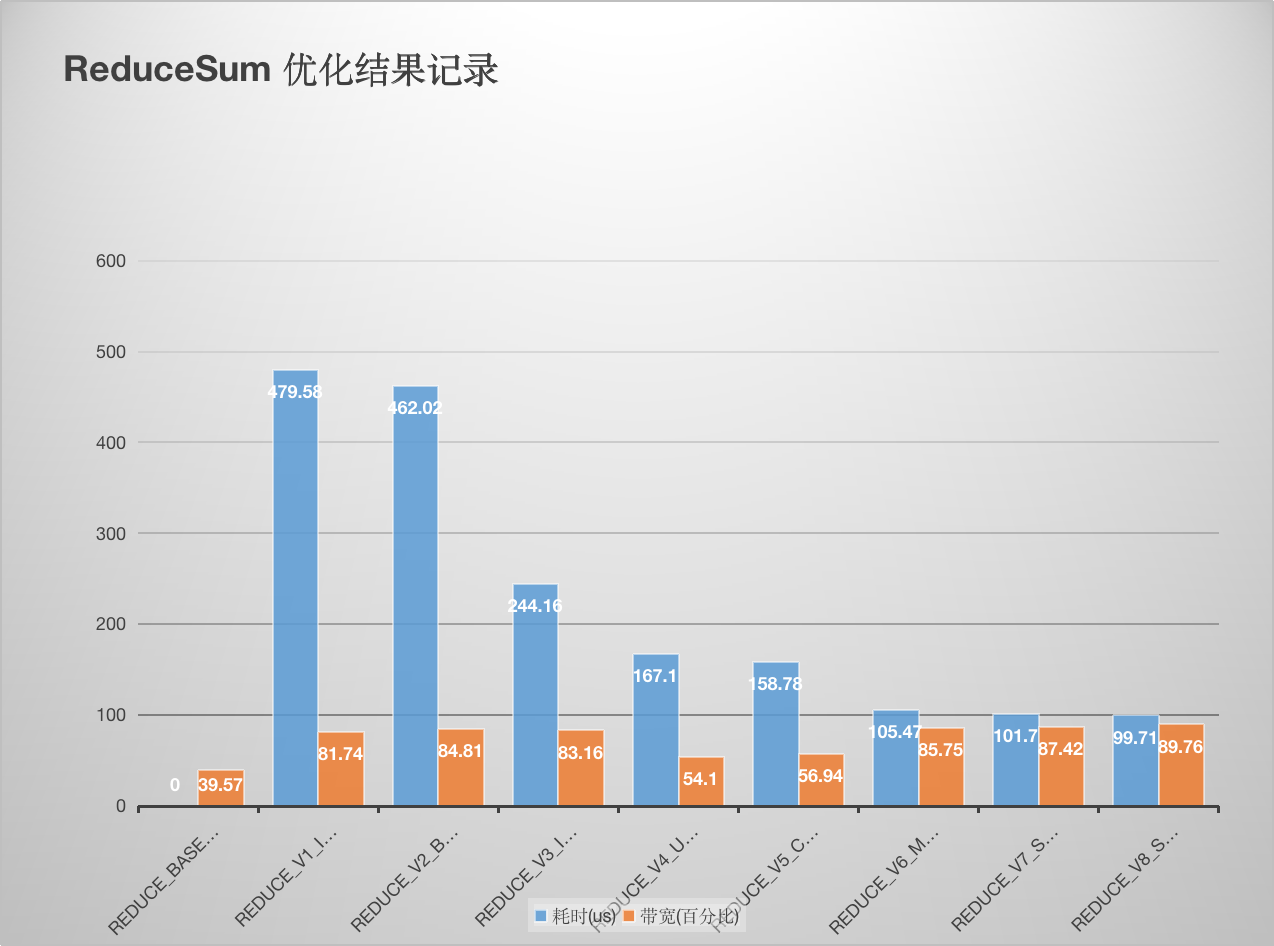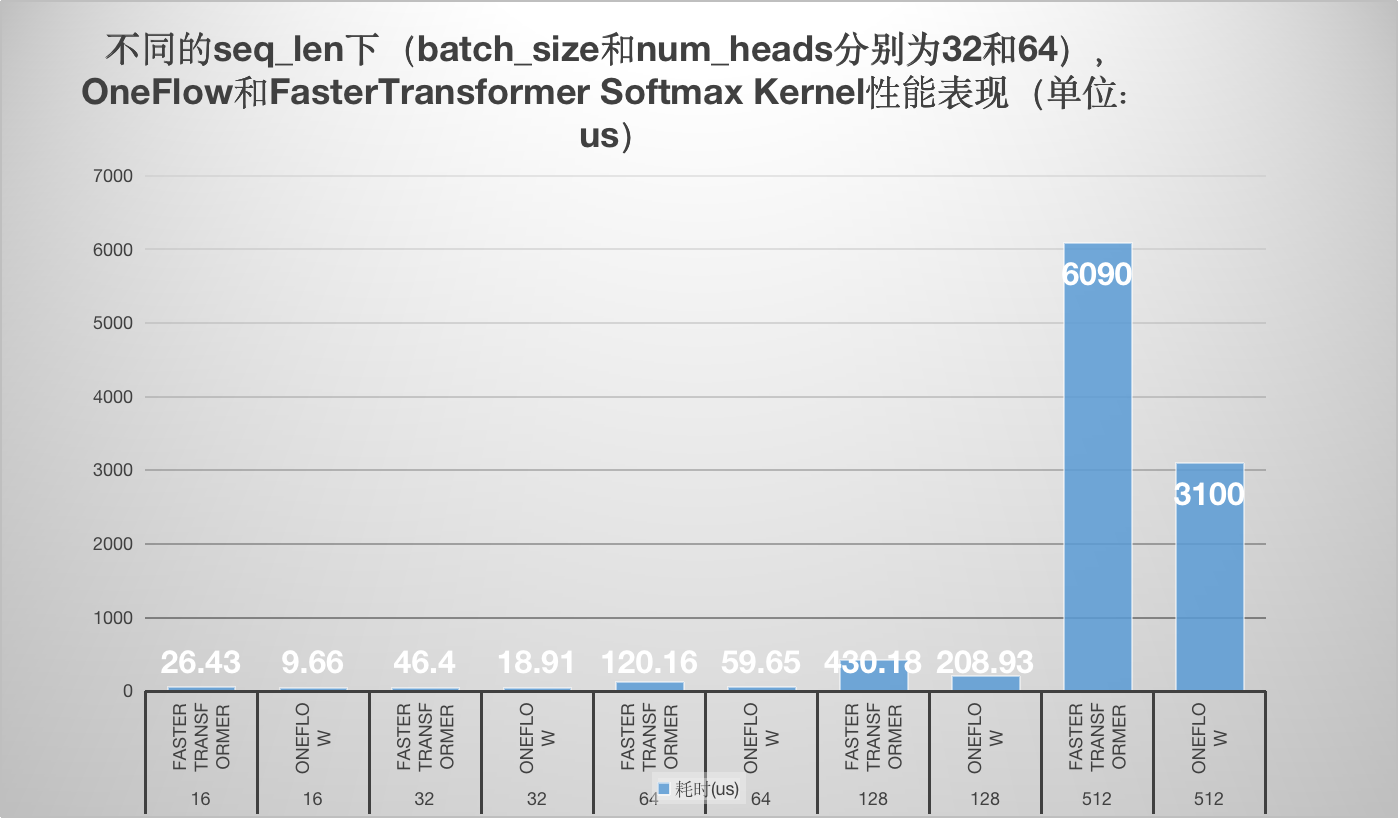我也维护了一个学习深度学习框架(PyTorch和OneFlow)的仓库 https://github.com/BBuf/how-to-learn-deep-learning-framework 以及一个如何学习深度学习编译器(TVM/MLIR/LLVM)的学习仓库 https://github.com/BBuf/tvm_mlir_learn , 有需要的小伙伴可以点一点star
本工程记录如何基于 cuda 优化一些常见的算法。请注意,下面的介绍都分别对应了子目录的代码实现,所以想复现性能的话请查看对应子目录下面的 README 。
记录如何手动编译 PyTorch 源码,学习 PyTorch 的一些 cuda 实现。
这里记录学习 NIVDIA 的reduce优化官方博客 做的笔记。完整实验代码见这里 , 原理讲解请看:【BBuf的CUDA笔记】三,reduce优化入门学习笔记 。后续又添加了 PyTorch BlockReduce 模板以及在这个模板的基础上额外加了一个数据 Pack ,又获得了一些带宽的提升。详细数据如下:
性能和带宽的测试情况如下 (A100 PCIE 40G):
将 oneflow 的 elementwise 模板抽出来方便大家使用,这个 elementwise 模板实现了高效的性能和带宽利用率,并且用法非常灵活。完整实验代码见这里 ,原理讲解请看:【BBuf 的CUDA笔记】一,解析OneFlow Element-Wise 算子实现 。这里以逐点乘为例,性能和带宽的测试情况如下 (A100 PCIE 40G):
| 优化手段 | 数据类型 | 耗时(us) | 带宽利用率 |
|---|---|---|---|
| naive elementwise | float | 298.46us | 85.88% |
| oneflow elementwise | float | 284us | 89.42% |
| naive elementwise | half | 237.28us | 52.55% |
| oneflow elementwise | half | 140.74us | 87.31% |
可以看到无论是性能还是带宽,使用 oneflow 的 elementwise 模板相比于原始实现都有较大提升。
实现的脚本是针对half数据类型做向量的内积,用到了atomicAdd,保证数据的长度以及gridsize和blocksize都是完全一致的。一共实现了3个脚本:
- https://github.com/BBuf/how-to-optim-algorithm-in-cuda/blob/master/FastAtomicAdd/atomic_add_half.cu 纯half类型的atomicAdd。
- https://github.com/BBuf/how-to-optim-algorithm-in-cuda/blob/master/FastAtomicAdd/atomic_add_half_pack2.cu half+pack,最终使用的是half2类型的atomicAdd。
- https://github.com/BBuf/how-to-optim-algorithm-in-cuda/blob/master/FastAtomicAdd/fast_atomic_add_half.cu 快速原子加,虽然没有显示的pack,但本质上也是通过对单个half补0使用上了half2的原子加。
性能和带宽的测试情况如下 (A100 PCIE 40G):
| 原子加方式 | 性能(us) |
|---|---|
| 纯half类型 | 422.36ms |
| pack half2类型 | 137.02ms |
| fastAtomicAdd | 137.01ms |
可以看到使用pack half的方式和直接使用half的fastAtomicAdd方式得到的性能结果一致,均比原始的half的原子加快3-4倍。
upsample_nearest_2d.cu 展示了 oneflow 对 upsample_nearest2d 的前后向的优化 kernel 的用法,性能和带宽的测试情况如下 (A100 PCIE 40G):
| 框架 | 数据类型 | Op类型 | 带宽利用率 | 耗时 |
|---|---|---|---|---|
| PyTorch | Float32 | UpsampleNearest2D forward | 28.30% | 111.42us |
| PyTorch | Float32 | UpsampleNearest2D backward | 60.16% | 65.12us |
| OneFlow | Float32 | UpsampleNearest2D forward | 52.18% | 61.44us |
| OneFlow | Float32 | UpsampleNearest2D backward | 77.66% | 50.56us |
| PyTorch | Float16 | UpsampleNearest2D forward | 16.99% | 100.38us |
| PyTorch | Float16 | UpsampleNearest2D backward | 31.56% | 57.38us |
| OneFlow | Float16 | UpsampleNearest2D forward | 43.26% | 35.36us |
| OneFlow | Float16 | UpsampleNearest2D backward | 44.82% | 40.26us |
可以看到基于 oneflow upsample_nearest2d 的前后向的优化 kernel 可以获得更好的带宽利用率和性能。注意这里的 profile 使用的是 oneflow 脚本,而不是 upsample_nearest_2d.cu ,详情请看 UpsampleNearest2D/README.md 。
在 PyTorch 中对 index_add 做了极致的优化,我这里将 PyTorch 的 index_add 实现 进行了剥离,方便大家应用于其它框架。具体请看 indexing 文件夹的 README 。其中还有和 oneflow 的 index_add 实现的各个 case 的性能比较结果。整体来说 PyTorch 在 index Tensor元素很小,但Tensor很大的情况下有较大的性能提升,其它情况和 OneFlow 基本持平。详情请看 indexing/README.md 。
OneFlow 深度学习框架中基于 cuda 做的优化工作,动态更新中。
总结 FastTransformer 相关的 cuda 优化技巧。README_BERT.md 总结了 BERT 相关的优化技巧。
学习了oneflow的softmax kernel实现以及Faster Transformer softmax kernel的实现,并以个人的角度分别解析了原理和代码实现,最后对性能做一个对比方便大家直观的感受到oneflow softmax kernel相比于FasterTransformer的优越性。
收集了和大语言模型原理,训练,推理,数据标注的相关文章。
- 【BBuf的CUDA笔记】一,解析OneFlow Element-Wise 算子实现
- 【BBuf的CUDA笔记】二,解析 OneFlow BatchNorm 相关算子实现
- 【BBuf的CUDA笔记】三,reduce优化入门学习笔记
- 【BBuf的CUDA笔记】四,介绍三个高效实用的CUDA算法实现(OneFlow ElementWise模板,FastAtomicAdd模板,OneFlow UpsampleNearest2d模板)
- 【BBuf的CUDA笔记】五,解读 PyTorch index_add 操作涉及的优化技术
- 【BBuf的CUDA笔记】六,总结 FasterTransformer Encoder(BERT) 的cuda相关优化技巧
- 【BBuf的CUDA笔记】七,总结 FasterTransformer Decoder(GPT) 的cuda相关优化技巧
- 【BBuf的CUDA笔记】八,对比学习OneFlow 和 FasterTransformer 的 Softmax Cuda实现
- 【BBuf的CUDA笔记】九,使用newbing(chatgpt)解析oneflow softmax相关的fuse优化
- CodeGeeX百亿参数大模型的调优笔记:比FasterTransformer更快的解决方案
- FlashAttention图解(如何加速Attention)
- FlashAttention:加速计算,节省显存, IO感知的精确注意力
- GPU内存(显存)的理解与基本使用
- 图文并茂,超详细解读nms cuda拓展源码
- 大模型的好伙伴,浅析推理加速引擎FasterTransformer
- 简单读读WeightOnly
- LLM Inference CookBook(持续更新)
- NVIDIA的custom allreduce
- [论文速读] FlashAttention: Fast and Memory-Efficient Exact Attention with IO-Awareness
- CUDA随笔之Stream的使用
- 简单读读FasterTransformer
- cutlass FusedMultiheadAttention代码解读
- 简单谈谈CUDA Reduce
- CUTLASS: Fast Linear Algebra in CUDA C++
- cutlass源码导读(1)——API与设计理念
- cutlass源码导读(2)——Gemm的计算流程
- CUDA GroupNorm NHWC优化
- 传统 CUDA GEMM 不完全指北
- 怎么评估内存带宽的指标,并进行优化?
- TensorRT Diffusion模型优化点
- NVIDIA GPU性能优化基础
- 一文理解 PyTorch 中的 SyncBatchNorm
- 如何开发机器学习系统:高性能GPU矩阵乘法
- CUDA SGEMM矩阵乘法优化笔记——从入门到cublas
- Dropout算子的bitmask优化
- 面向 Tensor Core 的算子自动生成
- PICASSO论文学习
- CUDA翻译:How to Access Global Memory Efficiently in CUDA C/C++ Kernels
- CUDA Pro Tips翻译:Write Flexible Kernels with Grid-Stride Loops
- [施工中] CUDA GEMM 理论性能分析与 kernel 优化
- CUDA Ampere Tensor Core HGEMM 矩阵乘法优化笔记 —— Up To 131 TFLOPS!
- Nvidia Tensor Core-CUDA HGEMM优化进阶
- CUDA C++ Best Practices Guide Release 12.1笔记(一)
- CUDA 矩阵乘法终极优化指南
- 如何用CUDA写有CuBLAS 90%性能的GEMM Kernel


